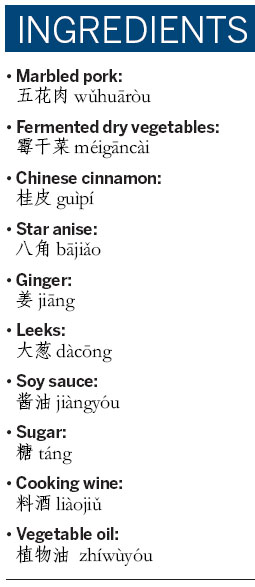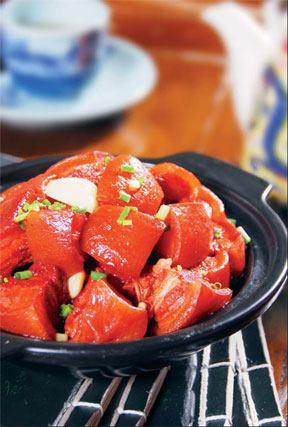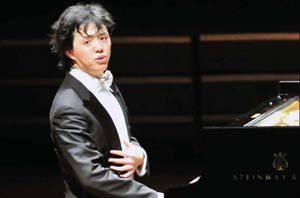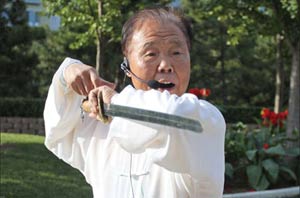Don't be a fool, eat the fat!
Updated: 2011-10-14 08:57
By Chloe Chen (陈洁) (China Daily)
|
|||||||||

Hongshaorou, the fatter it is, the better it is, and apparently the dish's succulent porky layers can make you a genius
一提起红烧肉,很多人都会流口水。它肥而不腻,入口酥软,据说还有补脑的奇效。
|
|
There's no need chew. When done right, the alternating layers of the fat and lean meat in hongshaorou (stewed pork in soy sauce, 红烧肉) melt delectably on the tongue. Perhaps that's why a survey of 10 favorite dishes for Chinese, conducted by The Commercial Press, founded that hongshaorou tops the list.
A humble homely dish, the gleaming reddish brown meat deserves a thumbs up when you're looking for something to xiafa (下饭) - go well with rice. The origins of the dish date back to the Song Dynasty (960-1279) poet Su Dongpo (苏东坡). Mr Dongpo, as his fans like to call him, had a penchant for words, as well as the drink and good old pork.
In 1080, the Song Emperor Shenzong exiled Dongpo to the remote district of Huanggang in Hubei province, where good wine and dainty morsels were scare. But the fearless poet-gourmand didn't let his spirit fall.
In exile, Dongpo had no private chef, so he experimented. He cut pork, his favorite meat, into 3 cm cubes and stewed it in water and cooking wine. After a painstaking two hours of meticulous stewing and simmering, hongshaorou was born.
To commemorate the occasion, Mr Dongpo even wrote a few lines, "heated by a slow fire, simmering in shallow water, its best qualities emerge when cooked for the perfect amount of time (慢着火,少着水,火候足时它自美 màn zháo huǒ, shǎo zháo shuǐ, huǒhou zú shí tā zì měi)".
Nine years later, Dongpo was posted as the local prefect of Hangzhou in Zhejiang province. He took his hongshaorou recipe with him and threw grand parties named after the dish. As hongshaorou's popularity grew, the dish with humble beginnings acquired the name of its creator - dongporou - and became one of the hallmarks of Zhejiang cuisine.
Zhejiang province wasn't the only place to claim ownership of the dish. During the Ming Dynasty (1368-1644), a poor old deaf man in Shaoxing gave the fatty cubes a new twist. Because he couldn't afford salt, he gave the meat a sprinkling of fermented dry vegetables (霉干菜 méigāncài), which still adorn version of the dish today.
The starving cook was also a staving artist-Xu Wei, great poet, painter and calligrapher. His version now gave Shaoxing cuisine a claim to hongshaorou as well.

The red cubes of marbled pork drew the famous and influential. Shortly after Chairman Mao Zedong announced the establishment of New China, he also declared hongshaorou his favorite dish. "It is the best food for nourishing the brain, especially the fatty meat," he decreed with confidence. "The intellectual class should eat it more."
If anyone could have turned stewed pork cubes into a trend, it would have been Chairman Mao. His fancy for hongshaorou swept the country and this influence has lasted over generations.
My mom used to make hongshaorou and warned me not to cut the fat. "Eat it! Do you know why Chairman Mao is so smart? It's because he ate fatty meat. Do you want to grow up a fool?"
I definitely want to join the ranks of intellectuals and not stay a fool. That's why I love hongshaorou and proclaim to my friends, "Sister's not eating meat here, she's ingesting knowledge." (姐吃的不是肉,姐吃的是化。Jiě chīde búshì ròu, jiò chī de shì wénhuà.)
To get a taste of authentic hongshaorou and "ingest knowledge", Xianheng Hotel (咸亨酒店 Xiánhēng Jiǔdiàn) is the place to go. Originally established in Shaoxing in 1894, the hotel's name comes from I-Ching (《易经》 Yì Jīng, The Book of Changes).
The name Xianheng literally means "everything goes down well". Now there are branches of the restaurant in Beijing, Hangzhou, Shanghai and Guangzhou.
With his round face and chubby cheeks, Ding Xianjiang, head chef at Xianheng Hotel in Beijing, might not be as drawn to the brain-boosting properties of hongshaorou as I am. But I do know he shares my love for the fatty meat.
"I cook it at home for my wife at least three times a month," he says. His secret to success? Counting the layers and cooking with care.
Courtesy of The World of Chinese, www.theworldofchinese.com
(China Daily 10/14/2011 page19)











